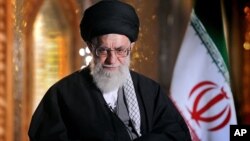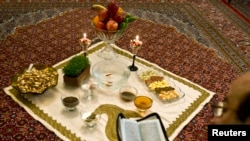CAIRO —
Iran's Supreme Leader Ayatollah Ali Khamenei delivered a televised speech to mark the Persian New Year, as most Iranians spent time with friends and family, preparing traditional foods for the Nowruz holiday.
U.S. President Barack Obama also spoke to the Iranian people for Nowruz, saying in a taped message released on Monday that the United States would like better relations with Iran, despite the differences, including over Tehran's controversial nuclear program:
The ayatollah's annual message was interspersed with greetings, wishes for a better future and angry diatribes against the West.
He said that life has its ups and downs, but what is important is that we arrive at the ups. He said that last year was marked by a conflict with Iran's enemies and that those enemies targeted both its political system and its economy, trying to hinder it with their sanctions.
Khamenei went on to urge his countrymen to work harder and invest more. He told them to “persevere, stay optimistic and be enthusiastic.” Iran's upcoming June presidential election, he said, will create a “road map” for the country over the next four years.
President Obama's Nowruz Message
President Obama's Nowruz Message
U.S. President Barack Obama also spoke to the Iranian people for Nowruz, saying in a taped message released on Monday that the United States would like better relations with Iran, despite the differences, including over Tehran's controversial nuclear program:
"I have had no illusions about the difficulty of overcoming decades of mistrust. It will take a serious and sustained effort to resolve the many differences between Iran and the United States. This includes the world’s serious and growing concerns about Iran’s nuclear program, which threatens peace and security in the region and beyond," he said.
Tehran says its nuclear program is peaceful while the West suspects it is working toward development of a nuclear weapon. Obama said the U.S. is eager to find a diplomatic solution.
“The United States prefers to resolve this matter peacefully, diplomatically. Indeed, if -as Iran’s leaders say- their nuclear program is for peaceful purposes, then there is a basis for a practical solution. It’s a solution that would give Iran access to peaceful nuclear energy while resolving once and for all the serious questions that the world has about the true nature of the Iranian nuclear program," he said.
Iranians, meanwhile, marked Nowruz with dance, music and traditional meals to celebrate the start of the new year.
Analyst Alex Vatanka of the Middle East Institute says many of Iran's political leaders, including President Mahmoud Ahmadinejad, are trying to promote traditional Persian holidays like Nowruz to focus on nationalism rather than the more religious aspects of the country's Islamic Republic.
"People such as Ahmadinejad the last few years, and people around Ahmadinejad who hope to be in office after June, are basically saying 'We are not sure if the clergy should be at the center, any more, and the way they challenge the rule of the clergy is by saying: 'Let's put Iran and Iranian nationalism and things like Nowruz, first," he said.
Iran's Nowruz holiday lasts for thirteen days of family gatherings and outings.





